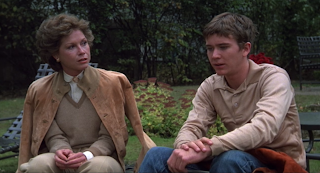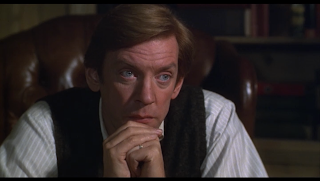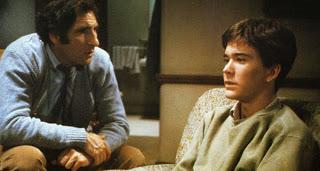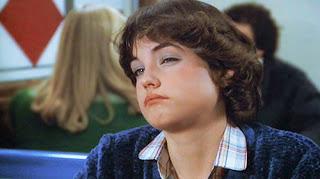 Robert Redford's Ordinary People (1980) is unjustly remembered for "stealing" Best Picture from Raging Bull. Certainly, Redford's directorial debut isn't an auteur showcase like Martin Scorsese's boxing epic, but its Oscar-win is well-deserved.
Robert Redford's Ordinary People (1980) is unjustly remembered for "stealing" Best Picture from Raging Bull. Certainly, Redford's directorial debut isn't an auteur showcase like Martin Scorsese's boxing epic, but its Oscar-win is well-deserved.Conrad Jarrett (Timothy Hutton) struggles to piece his life back together after a suicide attempt. We learn that his depression stems from failing to save his brother Buck from a boating accident. His father Cal (Donald Sutherland) offers smothering affection, while mother Beth (Mary Tyler Moore) cold indifference. Returning to school, he struggles in class and fails to connect with his old friends. As his life threatens to unravel, he turns to therapist Dr. Berger (Judd Hirsch) for guidance.
Based on Judith Guest's novel, Ordinary People scores with its remarkable sensitivity. Conrad's plight is depicted with care, made sympathetic without softening the edges of his trauma. He argues with his parents, bickers with teachers and ridicules Dr. Berger's efforts to reach him. Every change in routine strikes him as a defeat; every failure, however minor, becomes a soul-crushing defeat. His support systems fail him: his pals on the swim team try acting like nothing happened, while his coach (M. Emmet Walsh) offers sympathy with no real understanding. A furtive romance with singer Jeanette (Elizabeth McGovern) unravels when he overreacts to a stressful situation. Even his friendship with a fellow patient (Dinah Manoff) backfires when she offers unhelpful advice.
 Of course, when we meet Conrad's parents it's clear that he's not the only victim. Cal bends over backwards to comfort his son, but his deferential nature makes him ill-equipped to handle the situation (and to ignore his own torment). Beth, meanwhile, recasts herself as a tightly-wound matriarch, impervious to sentiment and struggling to project an image of domestic normalcy. An understandable defense mechanism, it convinces Conrad that she hates him (he hides his quitting the swim team for weeks) and pushing Cal away. She's so incapable of affection that a hug from her son inspires only credulity.
Of course, when we meet Conrad's parents it's clear that he's not the only victim. Cal bends over backwards to comfort his son, but his deferential nature makes him ill-equipped to handle the situation (and to ignore his own torment). Beth, meanwhile, recasts herself as a tightly-wound matriarch, impervious to sentiment and struggling to project an image of domestic normalcy. An understandable defense mechanism, it convinces Conrad that she hates him (he hides his quitting the swim team for weeks) and pushing Cal away. She's so incapable of affection that a hug from her son inspires only credulity.Redford, Guest and screenwriter Alvin Sargent are careful not to pin the Jarrett's unraveling purely on Buck's death. Trauma usually brings existing neuroses to the surface; how people react often reveals their true character. Conrad already suspected that his parents preferred Buck; the accident only exacerbates their rift and enhances his inferiority complex. In a heartbreaking scene, Cal wonders whether Beth ever really loved him; however unfair, it's also understandable. She spends so much time fussing over appearances and social proprieties that she's blind to deeper emotions.
 In the end, Ordinary People allows Conrad catharsis. Conrad's therapy sessions with Dr. Berger are contentious but feel real, without the histrionics expected of Hollywood psychodrama. Psychology isn't a cure-all but it can help with patients genuinely receptive to change. Thus with Conrad; he's gently goaded to reveal his demons, and comes out a better, more self-aware person for facing. Steeled with fresh resolve, he reconnects with Jeanette and makes a sincere effort to reconnect with mom and dad. His actions don't solve everything - indeed, the immediate consequences are bittersweet - but there's now a chance of everyone coming out the other side.
In the end, Ordinary People allows Conrad catharsis. Conrad's therapy sessions with Dr. Berger are contentious but feel real, without the histrionics expected of Hollywood psychodrama. Psychology isn't a cure-all but it can help with patients genuinely receptive to change. Thus with Conrad; he's gently goaded to reveal his demons, and comes out a better, more self-aware person for facing. Steeled with fresh resolve, he reconnects with Jeanette and makes a sincere effort to reconnect with mom and dad. His actions don't solve everything - indeed, the immediate consequences are bittersweet - but there's now a chance of everyone coming out the other side.Timothy Hutton won Best Supporting Actor for this role, unwarranted only so far as he's the lead rather than a supporting player. His acting feels restrained and naturalistic in a way teen actors rarely achieve; Hutton brings out nuances in the script through inflections in dialog and eccentric choices (a scene where he barks like a dog, a muttered stammer during his encounters with Jeanette) that make Conard feel real. It's a heartbreaking turn that ensures Ordinary People remains firmly grounded.
 Mary Tyler Moore's performance is remarkable: she takes a character who could easily be a one-dimensional shrew and makes her a stubborn, quietly tragic figure, a victim of shortcomings she can't control. Donald Sutherland, too, opts for restraint, allowing pain to bleed out through his jovial manner and efforts at conciliation until it becomes too much. Judd Hirsch plays a remarkably sensitive therapist, while Elizabeth McGovern is appealingly sweet in her film debut.
Mary Tyler Moore's performance is remarkable: she takes a character who could easily be a one-dimensional shrew and makes her a stubborn, quietly tragic figure, a victim of shortcomings she can't control. Donald Sutherland, too, opts for restraint, allowing pain to bleed out through his jovial manner and efforts at conciliation until it becomes too much. Judd Hirsch plays a remarkably sensitive therapist, while Elizabeth McGovern is appealingly sweet in her film debut.Ordinary People is a remarkable film in many ways: the understated but powerful emotions, the three-dimensional characters, the subtle writing where deeper emotions are hidden between the lines or revealed through gestures or vocal inflections. Perhaps the highest complement is that, while heartbreaking in its denoument, it offers its protagonists honest, well-earned hope...the most ordinary people can ask.

